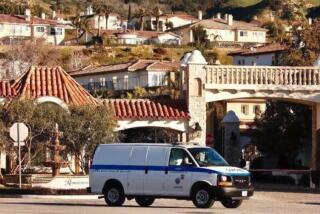Defendant Asked if He Used Cocaine Prior to Crash That Killed 4
- Share via
Under a prosecutor’s questioning, jurors heard for the first time Wednesday that Michael Reding, accused of killing a motorist and her three children while driving under the influence of alcohol, may have also taken cocaine.
In prior testimony, bartenders at Laredo’s Bar in Brea testified that Reding on the night of Oct. 23, 1984, had consumed five beers and four Kamikazes--a potent alcoholic drink--within a 2 1/2-hour period before he was refused any more service.
Reding, who took the witness stand for the first time in his trial, said he had used alcohol that day as a painkiller to help relieve discomfort from a leg injury.
However, Reding said his memory is “foggy” about events the night of the accident, in which Pamela Trueblood, 36, and her three children were killed after Reding’s car crossed a divider line and slammed into their automobile on State College Boulevard in Fullerton.
Two other children in the car survived. Reding is charged with four counts of second-degree murder and drunk driving causing injury.
Although Reding, 27, said he would not have gotten into a car if he had known it would result in someone being hurt, he told jurors he can now only remember turning to avoid hitting another car, and then waking up in a hospital.
Then Deputy Dist. Atty. Mike Jacob asked Reding: “Before leaving Laredo’s, did you use cocaine?”
The question drew an immediate objection from Reding’s lawyer and resulted in a recess to allow for a special hearing without the jury present.
The issue is significant because Reding’s blood, tested the night of the accident, showed that he had cocaine as well as alcohol in his system--a detail the prosecution had not revealed until Wednesday.
During the hearing, Jacobs said Reding’s tests showed a reading of 0.47 micrograms per milliliter of benzoyl ecgonine, a substance described in court as metabolized cocaine.
Reding’s attorney, Heidi Mueller, protested any introduction into evidence of Reding’s alleged cocaine usage because it has not been a factor in the prosecution’s case until now.
However, Jacobs said he had not planned to ask about the blood tests unless Reding got on the witness stand, so he could ask him point-blank.
Superior Court Judge James L. Smith ruled that the question was relevant only if Jacobs could prove that Reding had used cocaine within a time frame prior to the accident so that it impaired his driving ability or his ability to recall incidents that night.
With the jury later present, Reding answered the question and denied using cocaine “that day.”
More to Read
Sign up for Essential California
The most important California stories and recommendations in your inbox every morning.
You may occasionally receive promotional content from the Los Angeles Times.











